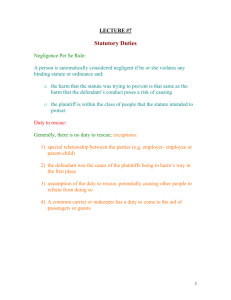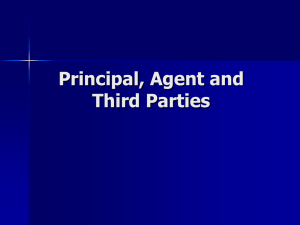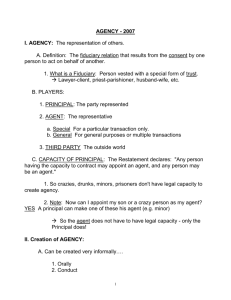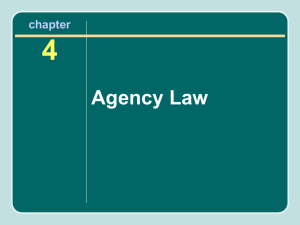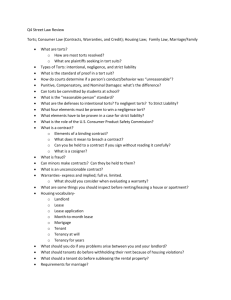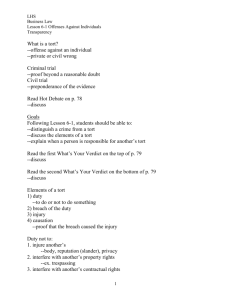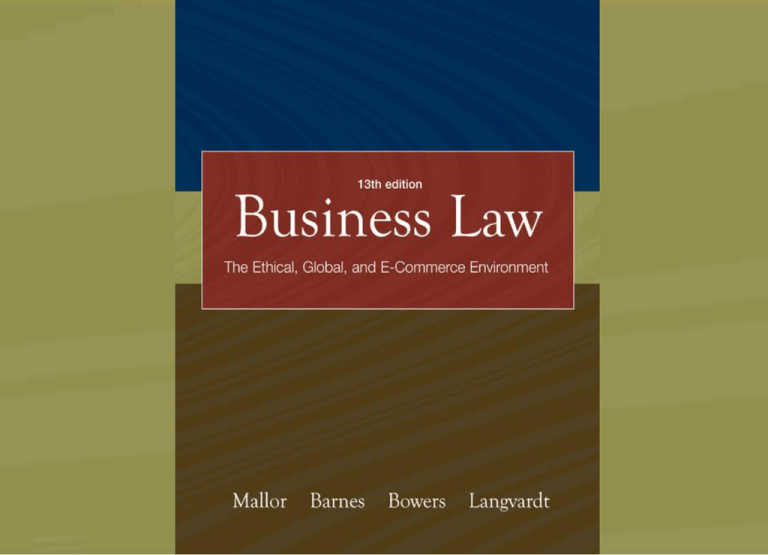
P A R T
8
Agency Law
The Agency Relationship
Third-Party Relations of the
Principal and the Agent
McGraw-Hill/Irwin Business Law, 13/e
© 2007 The McGraw-Hill Companies, Inc. All rights reserved.
C H A P T E R
36
Third-Party Relations of the
Principal and the Agent
“We cannot all be masters.”
William Shakespeare, Othello, Act 1, Scene 1
Learning Objectives
Contract liability of the principal
Contract liability of the agent
Contract suits against principal and agent
Tort liability of the principal
Tort liability of the agent
Tort suits against principal and agent
36 - 4
Contract Liability
Generally, a principal is liable on a contract
made by agent if agent had express, implied,
or apparent authority to make the contract
Agent’s liability to third parties for a contract
made on behalf of a principal depends on
whether principal was disclosed (not liable)
or undisclosed (liable)
36 - 5
Implied Warranty of Authority
If agent contracts for an existing, competent
principal but lacks authority, principal is not
bound, but it’s unfair to third party
Thus, agent bound on theory of an implied
warranty of authority to contract
See Reed v. National Foundation Life Insurance Co.
If agent lacks authority, principal may bind
to the contract by ratification
36 - 6
Principal’s Tort Liability
A principal may incur direct liability for an
agent’s torts because principal is at fault
Under doctrine of respondeat superior (let the
master answer), a principal is liable for torts
committed by agents (1) who are principal’s
employees and (2) who commit the tort while
acting within the scope of their employment
36 - 7
Principal liable for employee’s negligent and
intentional torts
Scope of Employment
Employee’s conduct is within the scope of
employment if conduct:
Was what employee was employed to perform
Occurred within authorized time period
Occurred within authorized location
Motivated by purpose of serving employer
36 - 8
Principal’s Tort Liability
Principal does not control independent
contractor’s work, thus principal not liable
for an independent contractor’s torts
Principal may be directly liable for negligent
hiring or contractor’s negligent performance
of nondelegable duty or dangerous activity
Principal may be liable, vicariously or
directly, for agent’s misrepresentations
36 - 9
Tort Liability of Agent
Agents are liable for their torts except when:
36 - 10
Agent exercises a privilege of the principal
Agent takes privileged action to defend his
or her person or principal’s property
Agent unknowingly makes a false statement
in conduct of principal’s business
Third parties are injured by defective tools or
instrumentalities furnished by principal
Test Your Knowledge
True=A, False = B
36 - 11
An agent is always liable for his own torts.
The doctrine of respondeat superior means that
a principal is liable for torts committed by
employees acting within the course and scope
of employment.
If an agent contracts for a legally existing and
competent principal but lacks authority to
enter contracts, the principal is not bound.
Test Your Knowledge
True=A, False = B
36 - 12
A principal is never liable for an independent
contractor’s torts.
Apparent authority arises if communications
by principal to third party creates reasonable
appearance of authority in the agent.
If a principal fails to inform the agent about a
defect in the product, the principal will be
directly liable for an agent’s torts.
Test Your Knowledge
Multiple Choice
Carl owned a a pizza business and employed
Zip to deliver pizzas. Carl knew that Zip
occasionally drank beer while driving, but
didn’t fire Zip. Zip injured Dan while
delivering pizzas and driving drunk. Is Carl
liable to Dan for Zip’s conduct?
(a) No, only Zip is liable. Drunk driving was
not within the scope of employment
(b) Yes, since Carl knew about Zip’s drinking
and negligently retained Zip
36 - 13
Test Your Knowledge
Multiple Choice
Carl’s Pizza hired Miller to be general
manager. Miller hired Sam for pizza prep
work. In general, would Carl’s Pizza be
obligated to honor the contract with Sam?
(a) No; only the owner of Carl’s Pizza can hire
Sam, thus Sam’s contract is void
(b) Yes; Miller acted with implied authority
since he is general manager and Carl’s Pizza
must honor Sam’s employment contract
36 - 14
Thought Questions
Do you think the doctrine of respondeat
superior is good policy? Why or why not?
36 - 15


